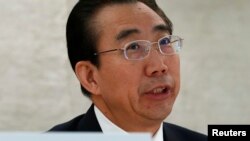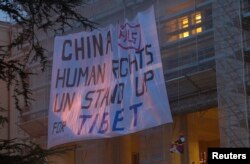China’s human rights record is under review for the second time under the United Nation’s Universal Periodic Review (UPR). Under this procedure, the U.N. Human Rights Council examines each nation’s record once every four years.
The last time China came under the human rights spotlight in 2009, Beijing accepted 42 recommendations made by other countries in attendance. In his statement to the council Tuesday, the head of the Chinese delegation acknowledged that not all of these recommendations have been implemented. However, he said his country has made great strides.
Special envoy for China’s foreign ministry Wu Hailong said China is a huge country of 1.3 billion people and its 56 ethnic groups faced many difficulties. But he said over the past four years his country has achieved a more prosperous economy, and improved democracy and the rule of law.
Speaking through an interpreter, Ambassador Wu said the Chinese government has strengthened the judicial system and increased protections of ethnic minorities.
“My government also ensures that minority ethnic groups in China enjoy extensive human rights. They participate in the management of state and local affairs as equals with the Han ethnic group. The ratio of leading officials with ethnic background is growing in ethnic minority area(s)," said Wu. "Their freedom of religious belief and the right to use and develop their spoken and written languages are fully respected and guaranteed. State investment in ethnic minority areas has kept expanding.”
Before the U.N. council began its review, a group of five Tibetan activists scaled the U.N. building and unfurled a banner that said “China fails human rights in Tibet -- U.N. stand up for Tibet.”
A senior program officer for Human Rights in China, Shiwei Ye, told VOA the Chinese government implements very severe and restrictive policies on political and civil rights, as well as on social, economic and cultural rights.
Despite these concerns, he noted that since the last UPR in 2009, there has been a continued explosion of citizen activism in China that gives him hope that things will change for the better.
“Of course ,on the other hand, there is a serious crackdown ongoing. But. despite the crackdown, citizens are becoming less afraid to speak out. And, because they are less afraid, the government is growing more afraid of its own citizens. So, we hope that China will stop being afraid of its own citizens and start listening to them and start working with citizens to address their legitimate grievances because this is key to sustainable development and the healthy development of the rule of law in China,” said Ye.
In his closing remarks, Ambassador Wu said that China was aware of the many difficulties and challenges it faced in promoting and protecting human rights. But, he added his government was sure that by creating a prosperous society, China also would witness even greater achievements in human rights.





